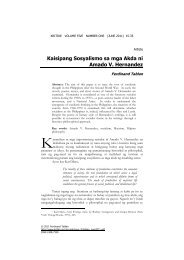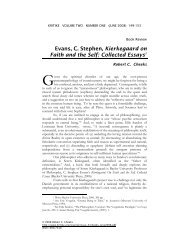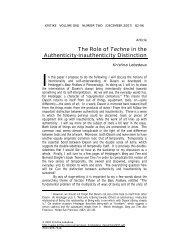The Paradox of Ipseity and Difference: Derrida's Deconstruction and ...
The Paradox of Ipseity and Difference: Derrida's Deconstruction and ...
The Paradox of Ipseity and Difference: Derrida's Deconstruction and ...
Create successful ePaper yourself
Turn your PDF publications into a flip-book with our unique Google optimized e-Paper software.
48 THE PARADOX OF IPSEITY AND DIFFERENCE<br />
structure <strong>of</strong> generalized reference. It is a trace, <strong>and</strong> a trace<br />
<strong>of</strong> the erasure <strong>of</strong> the trace. 58<br />
Hence, the trace, as a marker <strong>of</strong> the repetition <strong>of</strong> singularities in its<br />
erasure, is the preservation <strong>of</strong> presence through metaphysics. It is an<br />
unavoidable recourse to what was present that leads us to utilize a very limited<br />
sense <strong>of</strong> presence. <strong>The</strong> text then, <strong>of</strong> metaphysics, is comprehended, 59 restored, not in<br />
its original purity, but nonetheless restored to its possibility <strong>of</strong> coming into<br />
consciousness, both as an other <strong>and</strong> at the same time an ipseity <strong>of</strong> the trace <strong>of</strong> the<br />
trace.<br />
One will also say then, without absolute finality, that we can opt that the<br />
trace, in its fleeting state <strong>of</strong> referring <strong>and</strong> deferring, is the very concept <strong>of</strong> radical<br />
absence itself, an absence that can haunt the present. In its essential haunting, it<br />
transforms itself, like the ouroboros, constantly consuming itself to become other<br />
than itself. Différance is the activity that occurs within the reading/writing <strong>of</strong> the<br />
trace. It is the economy that opens the range <strong>of</strong> possible recurrence <strong>of</strong> the trace<br />
in time, <strong>of</strong>fending its past, <strong>and</strong> at the same time its future in order to make the<br />
present come into the fore <strong>of</strong> our thoughts in the fleeting singularity <strong>of</strong> time. 60<br />
Towards the Possibility <strong>of</strong> an Ontology <strong>of</strong> Singularity<br />
It is, for Derrida, not impossible to speak <strong>of</strong> reality in its essential<br />
différance. Logocentrism as an essential foundation <strong>of</strong> episteme becomes a model<br />
<strong>of</strong> singularity in which knowledge is anchored upon. We cannot make things<br />
meaningful without the center for in our attempt to communicate thoughts <strong>and</strong><br />
express our sense <strong>of</strong> reality (extra-mental or otherwise), we are always already at<br />
the mercy <strong>of</strong> time in its fleeting presence <strong>and</strong> absence. Derrida’s point is that we<br />
should take the logos as a center for differing <strong>and</strong> referring singularly, <strong>and</strong> in this<br />
singularity that eludes us, we are always doing deconstruction actively <strong>and</strong><br />
passively. 61 <strong>The</strong> movements <strong>of</strong> time <strong>and</strong> space will always sway our<br />
consciousness <strong>of</strong> reality; <strong>and</strong> in this swaying we are advised by Derrida to take<br />
reality as a singularity occurring within the folds <strong>of</strong> time <strong>and</strong> space. Our search<br />
for the elusive <strong>and</strong> polymorphic signified is not in vain, since it was always already<br />
been there, as traces. One then will be able to say that there was really something behind<br />
the text, but in saying what that thing is, is something that we cannot really<br />
answer with absolute certainty. <strong>The</strong> traces <strong>of</strong> the signified, that is also essentially a<br />
signifier, is not simply Derrida’s method, is not a game <strong>of</strong> playing tag in which<br />
58 Ibid., 24.<br />
59 Ibid.<br />
60 This is in allusion to Nietzsche’s Zarathustra.<br />
61 In the espousal <strong>of</strong> ipseity <strong>and</strong> difference within the operation <strong>of</strong> deconstruction, one<br />
realizes that the mediation <strong>of</strong> one’s subjectivity will always already be at work within the act <strong>of</strong><br />
representing the representation <strong>of</strong> consciousness. Thus, in a reading or an interpretation <strong>of</strong> a text<br />
or object, one never really reads the same representation as it was intended by its author, what<br />
would be had is merely an innovated or even an ersatz <strong>of</strong> a trace that becomes the further<br />
erasure <strong>of</strong> the trace.
















